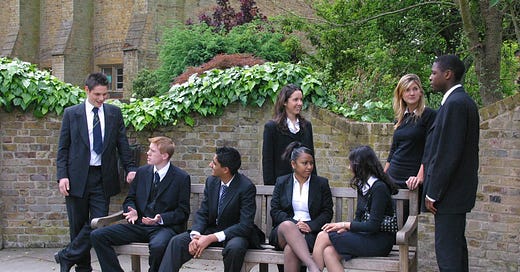
We need to talk about Gen Z
We should be most worried by the increasing gloominess manifested by Gen Z. Things are not getting better in their eyes.
We need to talk about Gen Z – the pop sociological “cohort” encompassing those born between 1997 and 2012.
For millennia, older generations have been worried about the attitudes of the rising generations. Recent opinion surveys of today’s under-30s paint a troubling picture.
“Gen Z aren’t proud of Britain and wouldn’t fight to save it”, thunders The Times, reporting a major poll it has commissioned from YouGov. Alex Mahon, the chief executive of Channel 4 is even more upset reporting the findings of another questionnaire, this time by Craft. “We found, shockingly, that 52% say they think the UK would be better with a strong leader, unfettered by Parliament and elections”, she told the Royal Television Society.
If Gen Z, and those who come after them, adhere to these views through the coming decades, then the values and political settlement embraced by Baby Boomers seem doomed.
As ever there are caveats. Psephologists always advise looking at the trend between polls taken at different times rather than the totals on any given day. The Times draws comparisons with a similar poll twenty years ago, questioning Millennials, who were then the rising generation. The paper has also limited itself to adults of voting age, 18-27, a slightly narrower cohort than all “Gen Z” which extends down to those who are currently just twelve years old.
There are some big changes between opinions expressed in 2004 and those in 2024. Back then, 80% were “proud to be British”, now it's just 41%, a minority. Some 22% would “fight for the country” back then, and just 11% now. The number who say they would “never” fight is up from 19% to 41%.
Today’s younger voters are also less trustful of the police and the NHS. More of them, 48%, think this is a “racist country”. The proportion who think immigration is “good” is up from 52% to 76%.
More in 2024 than 2004 think marriage is a relevant institution, and sex outside marriage appears to be in a steep decline. Approximately 78% in 2004 reckoned one-night stands were commonplace, only 23% do now. Condom use is up (65%) and viewing porn down to 40% from 65%.
Gen Z are in favour of transgender rights. There are no clear comparisons with twenty years ago since there was little focus then on the topic.
Taken overall, Gen Z are more socially conservative than their parents’ generation. They worry more about prejudice, and they don’t like the idea of fighting a war.
The increase in pacifist sentiment is obviously bad news for urgently needed recruitment into the armed forces. But the lack of respect for enlistment is not out of step with a succession of governments that have cashed the peace dividend and let the army, navy and air force dwindle in size as defence’s share of national spending has declined.
It is worth remembering that the YouGov question was theoretical; we are not currently at war even if concern is rising. Famously in 1933, the establishment elite at the Oxford University Union voted “that his House will under no circumstances fight for its King and Country”. They are now celebrated as “the Greatest Generation” who fought and defeated fascism in the Second World War a matter of years later.
We should be most worried by the increasing gloominess manifested by Gen Z. Things are not getting better in their eyes.
In many respects, Gen Z’s concerns are similar to those of older adult cohorts. Surveys such as the 25-year-old Edelman Trust Barometer show plunging trust in mainstream politics and media. Today’s political leaders are reluctant to recognize the general rather than generational malaise.
The leaders of the opposition are in denial mode. Rather than consider the nuanced views expressed by Gen Z, which are not all at ideological odds with them, they have weaponised the survey for use in the culture wars.
Reacting to The Times poll, the leader of the opposition attacked DEI (diversity, equality and inclusion), just like MAGA in the US. “Almost half of young Brits think their country is racist? Seriously?”, Kemi Badenoch commented sarcastically, “This is what happens when we let divisive narratives run wild without setting the record straight.”
Nigel Farage of Reform UK also blames progressive education. “I think the educational system, at school and particularly university, is wilfully poisoning the minds of all out young people about who we are as a country, our history and what we stand for.”
Stupid us, stupid them, if only we’d drummed into the kids that their own life experience is mistaken. As Sunder Katwala of the British Future think tank points out, it depends how they took the question. The high score for “racism” may just be recognition that race is relevant in a multicultural society and should be diminishingly so.
Sir Keir Starmer’s spokesperson offered a flat footed, one-size-fits-all non-answer, babbling that the prime minister “understands the frustrations that young people feel… they see the stagnating living standards or the state of the public services”.
None of the main party leaders chose to address the particularities of Gen Z’s life experience, which must have contributed to their increased disengagement. All in the cohort had their education severely disrupted by the Covid pandemic, which wiped out staging points in a normal adolescence. They missed nearly two years of socialising and group learning. When it was all over, Boris Johnson’s government funded only £1.4 billion of the £15bn recommended for school recovery by its own “Catch-up Tsar” Sir Kevan Collins. Those who were at university are still saddled with student debt. Pressure on housing means Generation Z are joining Millennials in “Generation Rent”.
Not all teachers or university lecturers are “woke”, but the war on “wokeism” has resulted in fair minded pedagogic discussion of current affairs being squeezed out of the national curriculum. Meanwhile, young people had little alternative but to turn to the internet where the likes of Andrew Tate and Jordan Peterson were selling snake oil for social alienation, especially to young men.
This country has offered Gen Z less than it should have done. National political leadership has been feeble, negative and divisive. For example, Brexit gave away their rights to freedom of movement and they resent it.
It is not surprising that Gen Z are not particularly proud of Britain and are prepared to toy with other forms of leadership. They will feel invested in the country, when and if the nation invests in them and their successors.
We need to do more than talk about, and tut-tut about, the younger generations. Unless the education sector is strengthened and broadened in qualitative terms and liberated from political short termism, we will not need the trend in the next poll in twenty years’ time to tell us what a crisis we will be engulfed in.













“The likes of Andrew Tate and Jordan Peterson “
Stop there. To bracket those two names, This piece is not worth reading.
48% thinking this is a racist country today, will sound ridiculous to older generations who lived through earlier decades.